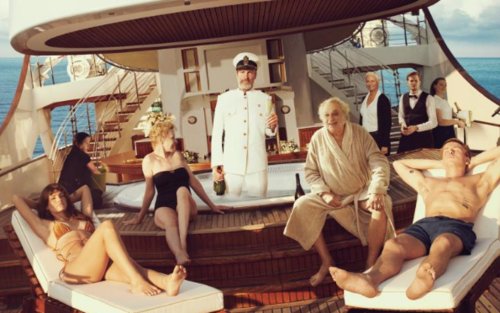Ruben Östlund’s ‘Triangle of Sadness’, like Mark Mylod’s ‘The Menu’, is going to make the 0.01% feel very uncomfortable. Layered with messages, satire and wit, its goal is to give the ultra-wealthy a reality check, and take them to a place where a Rolex and a fish are worth roughly the same.
Triangle of Sadness is aptly unpacked in three parts. The first act introduces us to Carl (Harris Dickinson) and Yaya (The late Charlbi Dean Kriek), highlighting the behind-the-screens life of two model influencers.
At this stage, the chaos that shrouds the film is mild. Yaya and Carl find themselves at the awkward end of a dinner where the bill sits as the intruding third guest. Carl waits to see if Yaya will pay for the meal as she had promised, while Yaya chooses ignorance until Carl eventually brings the matter to light.
The audience gets to see the dynamic of the two and the relationship’s sensitive shallowness in full force. The two have different understandings of their pairing, layered with gender role jabs.
From the first few minutes of the film, we’re told all we need to know to understand the world the couple live in. Relationships are almost narcissistic in that they are transactional. The depths they reach are limited (Yaya and Carl paired up initially because it was good for business) and love seems more like something Carl thinks he should feel, than what he actually does. Yaya is merely along for the ride, but simultaneously sits in the driver’s seat. They both play the roles they think they must play, and money is their director.
We soon end up on a luxury cruise ship (the second act) where the first conversation we’re invited to is part of the ship staff’s meeting emphasising the need to make everything perfect in hopes of receiving a tip at the end.
Yaya and Carl find themselves aboard the ship in exchange for promoting the experience. We’re reintroduced to them sleeping in as Dolly de Leon’s Abigail stands on the outskirts trying to clean their room.
Perfection is confused with what many of us would deem unrealistic. However, the wealthy guests we’re introduced to are so far disconnected from reality you’d be forgiven for wondering if any of them are mentally stable. There is even an elderly British couple whose business is weapons, and they have no social understanding of why talking about how UN regulations put them through hard times isn’t exactly a tear-jerker.
All the guests express their vanity in different ways which is to be expected. However, so do the staff.
The climax of the yacht act is not for those with a weak stomach. The gluttony of multi-course meals and rocky waters that create the Captain’s Dinner (in honour of a morbidly alcoholic Woody Harrelson) ends up in an explosion of bodily rejection from the guests that Öslund shares with great (and somewhat unnecessary detail).
Captain Thomas, on the other hand, winds up in a deeply socio-political conversation on the ship’s speaker with a wealthy Russian man—the intellectual soundtrack to downright mayhem.
The third and final scene sees the guests washed up after an ironic attack on the boat (beyond its bowls), left on an island to fend for themselves.
At this stage, all the layers of the film have been stripped and its true message is apparent: how will the rich survive without their toys?
Abigail soon comes to the rescue on a lifeboat with resources, but not as the cleaning lady many saw her as. She is the captain now after all, being the only one with the life skills necessary for survival.
But, as anyone who has read Animal Farm or Lord of the Flies know, power is its own force to be reckoned with, especially for those who have never had it.
‘Triangle of Sadness’ or chaos, is an obvious social commentary. Like ‘White Lotus’, it gives us a slow and steady look into the behaviours people we might hope to never be like. However, it’s thrill is in the unpacking. Each act is a telling of survival. Yaya’s learned to survive through manipulation as we learn in act one. The wealthy have learned to survive by relying on others (act two) while the staff have learned to rely on falsities. Act three shows us what happens when these roles are switched and turned upside down, and makes us wonder what the world would look like if it were that island.
‘Triangle of Sadness’ has earned three Oscar nominations, including Best Picture, Best Director and Best Original Screenplay.
Worth the nominations? Let us know your thoughts.
ALSO SEE:
Feature Image: Shared by Nu Metro

